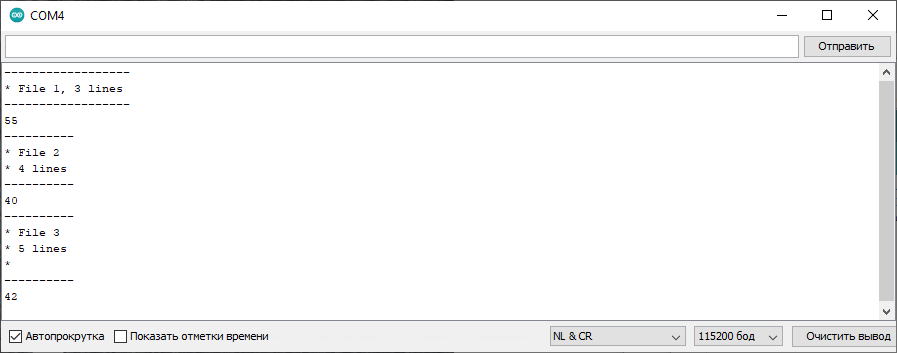Bonjour, Khabrovites!
Ceci est mon premier article et j'ai quelque chose à partager. Peut-être que mon vélo n'est pas nouveau et que tout le monde utilise cette méthode, mais une fois je cherchais une solution, je ne pouvais pas la trouver tout de suite.
De quoi sommes nous en train de parler?
La tâche était d'inclure des fichiers: HTML , JS , CSS ; sans formation spéciale. Il est également peu pratique de connecter des fichiers binaires (par exemple, des images ) en les convertissant en HEX . Comme je ne voulais pas convertir en HEX ou diviser en lignes, je cherchais un moyen de connecter le fichier à l' espace d'adressage du programme .
À quoi ça ressemble habituellement
Exemple, avec division de ligne:
const char text[] =
"<html>" "\r\n"
"<body>Text</body>" "\r\n"
"</html>";
Exemple, avec HEX (plus adapté aux données binaires):
const char text[] =
{
0x3C, 0x68, 0x74, 0x6D, 0x6C, 0x3E, 0x0A, 0x3C,
0x62, 0x6F, 0x64, 0x79, 0x3E, 0x54, 0x65, 0x78,
0x74, 0x3C, 0x2F, 0x62, 0x6F, 0x64, 0x79, 0x3E,
0x0A, 0x3C, 0x2F, 0x68, 0x74, 0x6D, 0x6C, 0x3E,
0
};
J'ai même vu ceci:
#define TEXT "<html>\r\n<body>Text</body>\r\n</html>"
const char text[] = TEXT;
#define .h Python. , \ . .
, , , :
extern const char text[];
, Assembler.
Arduino IDE
text.S, text.htm.
text.htm:
<html>
<body>Text</body>
</html>
text.S:
.global text
.section .rodata.myfiles
text:
.incbin "text.htm"
.byte 0
\0 , .
:
extern const char text[] PROGMEM;
void setup()
{
Serial.begin(115200);
Serial.println(text);
}
void loop() { }
, :

, - , .
AVR8, ESP8266 . , Flash 32 32 . , , :
.global text
.section .rodata.myfiles
.align 4
text:
.incbin "text.htm"
.byte 0
: .irom.text, .rodata.
STM32 32 , .
? , . :
.global text, text_size
.section .rodata.myfiles
text:
.incbin "text.htm"
text_end:
.byte 0
text_size:
.word (text_end - text)
:
extern const char text[] PROGMEM;
extern const uint16_t text_size PROGMEM;
, :
.macro addFile name file
.global \name, \name\()_size
// .align 4
\name:
.incbin "\file"
\name\()_end:
.byte 0
// .align 4
\name\()_size:
.word (\name\()_end - \name)
.endm
.section .rodata.myfiles
addFile text1 1.txt
addFile text2 2.txt
addFile text3 3.txt
:
#define ADD_FILE(name) \
extern const char name[] PROGMEM; \
extern const uint16_t name##_size PROGMEM;
ADD_FILE(text1);
ADD_FILE(text2);
ADD_FILE(text3);
void setup()
{
Serial.begin(115200);
Serial.println(text1);
Serial.println(text1_size);
Serial.println(text2);
Serial.println(text2_size);
Serial.println(text3);
Serial.println(text3_size);
}
void loop() { }
:

, .
, GNU toolchain
, Arduino. Arduino toolchain Atmel.
Makefile - .
STM32, . WEB- LWIP / HTTPD.
version.sh:
#!/bin/bash
# Version generator
# running script from pre-build
MAJOR=1
MINOR=0
cd "$(dirname $0)" &>/dev/null
FILE_VERSION="version.txt"
FILE_ASM="version.S"
BUILD=$(head -n1 "$FILE_VERSION" 2>/dev/null)
if [ -z "$BUILD" ]; then
BUILD=0
else
BUILD=$(expr $BUILD + 1)
fi
echo -n "$BUILD" >"$FILE_VERSION"
cat <<EOF >"$FILE_ASM"
/**
* no editing, automatically generated from version.sh
*/
.section .rodata
.global __version_major
.global __version_minor
.global __version_build
__version_major: .word $MAJOR
__version_minor: .word $MINOR
__version_build: .word $BUILD
.end
EOF
cd - &>/dev/null
exit 0
version.S version.txt .
Makefile pre-build:
#######################################
# pre-build script
#######################################
pre-build:
bash version.sh
all pre-build:
all: pre-build $(BUILD_DIR)/$(TARGET).elf $(BUILD_DIR)/$(TARGET).hex $(BUILD_DIR)/$(TARGET).bin
printf macro.h:
extern const uint16_t __version_major;
extern const uint16_t __version_minor;
extern const uint16_t __version_build;
#define FMT_VER "%u.%u.%u"
#define FMT_VER_VAL __version_major, __version_minor, __version_build
HTTPD LWIP , HTTP. , fsdata.c. fsdata_custom.c, HTTPD_USE_CUSTOM_FSDATA.
fsdata_custom.c:
#include "lwip/apps/fs.h"
#include "lwip/def.h"
#include "fsdata.h"
#include "macro.h"
extern const struct fsdata_file __fs_root;
#define FS_ROOT &__fs_root
fsdata_make.S:
.macro addData name file mime
\name\():
.string "/\file\()"
\name\()_data:
.incbin "mime/\mime\().txt"
.incbin "\file\()"
\name\()_end:
.endm
.macro addFile name next
\name\()_file:
.word \next\()
.word \name\()
.word \name\()_data
.word \name\()_end - \name\()_data
.word 1
.endm
.section .rodata.fsdata
.global __fs_root
/* Load files */
addData __index_htm index.htm html
addData __styles_css styles.css css
addData __lib_js lib.js js
addData __ui_js ui.js js
addData __404_htm 404.htm 404
addData __favicon_ico img/favicon.ico ico
addData __logo_png img/logo.png png
/* FSDATA Table */
addFile __logo_png 0
addFile __favicon_ico __logo_png_file
addFile __404_htm __favicon_ico_file
addFile __ui_js __404_htm_file
addFile __lib_js __ui_js_file
addFile __styles_css __lib_js_file
__fs_root:
addFile __index_htm __styles_css_file
.end
, mime.
html.txt:
HTTP/1.1 200 OK Content-Type: text/html; charset=UTF-8 Connection: close
404.txt:
HTTP/1.1 404 Not found Content-Type: text/plain; charset=UTF-8 Connection: close
Notez la ligne vide, qui est requise par la spécification HTTP pour marquer la fin de l'en-tête. Chaque ligne doit se terminer par CRLF (\ r \ n).
PS Le code du projet provient d'un coffre délabré, donc l'implémentation pourrait oublier quelque chose à clarifier.
À la fin
Je cherchais quelque chose d'utile dans l'article depuis longtemps. J'espère que mon expérience sera utile pour un débutant et un gourou.
Merci pour votre attention, bons développements!